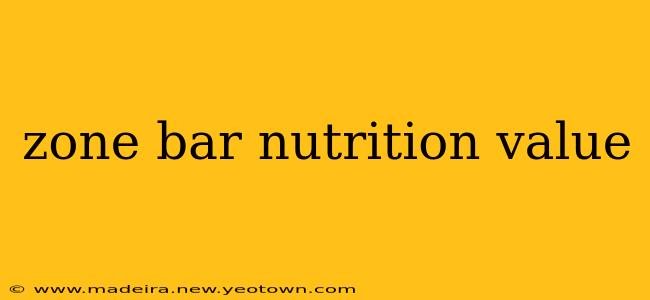The Zone diet, a popular approach to weight management and overall health, emphasizes balanced macronutrient intake. Central to this diet is the Zone bar, a convenient and protein-packed snack designed to keep you within your ideal metabolic zone. But what exactly is in a Zone bar, and how does its nutritional value stack up? Let's unravel the mysteries of this popular dietary staple.
What are the Main Ingredients in a Zone Bar?
Zone bars typically contain a blend of protein, carbohydrates, and healthy fats, carefully proportioned to maintain the 40:30:30 macronutrient ratio advocated by the Zone diet. This ratio aims to optimize insulin response, stabilize blood sugar levels, and promote satiety. Expect to find ingredients like whey protein isolate (a fast-digesting protein source), soy protein isolate (a slower-digesting option), various nuts and seeds (providing healthy fats and fiber), and a blend of simple and complex carbohydrates for sustained energy release. Specific ingredients vary slightly depending on the flavor.
How Many Calories Are in a Zone Bar?
The calorie count for a Zone bar generally falls within the range of 200-250 calories per bar. However, it's always crucial to check the nutritional information panel on the specific bar you're consuming, as variations exist based on flavor and size. Calorie needs vary drastically depending on individual factors like age, activity level, and overall health goals, so this information is a guide and not a prescription.
What is the Protein Content of a Zone Bar?
Protein is a key component of Zone bars, typically contributing around 15-20 grams per bar. This protein content helps you feel fuller for longer, aiding in weight management and providing essential amino acids for muscle repair and growth. The blend of whey and soy protein offers a combination of fast and slow-digesting proteins, providing a sustained release of amino acids into the bloodstream.
Are Zone Bars Good for Weight Loss?
Zone bars, when incorporated as part of a balanced Zone diet, can be beneficial for weight loss. Their balanced macronutrient profile can help manage hunger cravings, preventing overeating. However, it’s important to remember that no single food is a magic bullet for weight loss. Consistent adherence to a healthy eating plan, coupled with regular exercise, is crucial for achieving and maintaining a healthy weight. The Zone bar can be a helpful tool within this larger strategy.
Are Zone Bars Keto-Friendly?
No, Zone bars are generally not considered keto-friendly. The Zone diet, while focusing on balanced macronutrients, isn't as low in carbohydrates as a ketogenic diet. The presence of carbohydrates in Zone bars, while being part of the balanced ratio, would likely exceed the carbohydrate limits typically recommended in a ketogenic diet.
What are the Benefits of Eating Zone Bars?
The benefits of consuming Zone bars, primarily within the context of the Zone diet, include:
- Improved blood sugar control: The balanced macro ratio helps prevent blood sugar spikes and crashes.
- Enhanced satiety: The protein and fiber content contribute to feeling fuller for longer periods.
- Increased energy levels: The combination of protein and carbohydrates provides sustained energy throughout the day.
- Convenient and portable: They serve as a quick and healthy option for those on the go.
Important Note: While Zone bars can be a valuable part of a healthy diet, they shouldn't be the sole focus. A balanced diet rich in whole foods, including fruits, vegetables, and lean proteins, is always recommended for optimal health and well-being. Consult with a registered dietitian or healthcare professional to determine if Zone bars are a suitable addition to your personal dietary plan.

